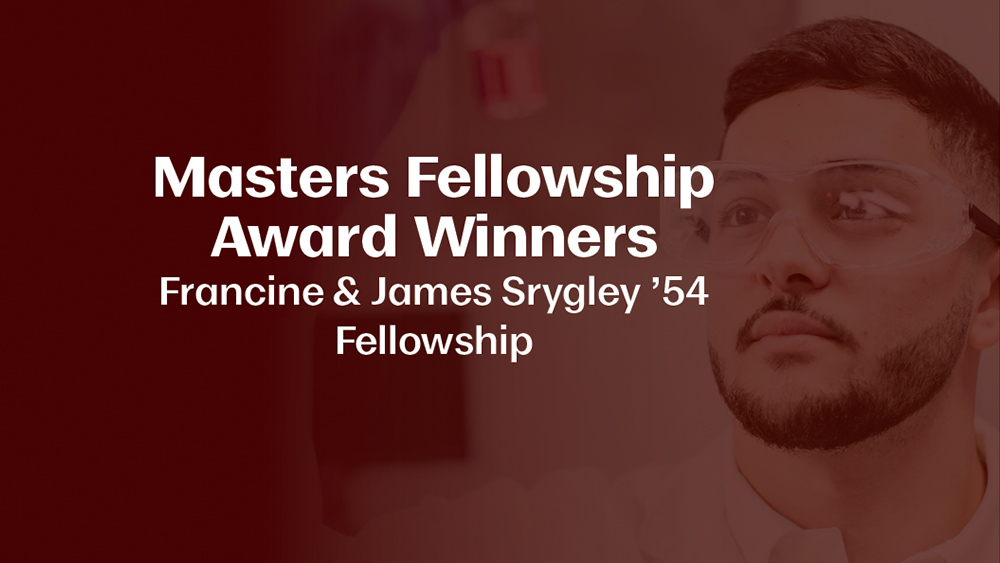
As a stepping stone to their future careers and someday world-changing research, 10 chemical engineering master's students from the Artie McFerrin Department of Chemical Engineering at Texas A&M University have received the 2023/2024 Francine & James Srygley ’54 I Fellowship.
This year’s students include Raj Panthesh Bhavsar, Jitendra Choudhary, Gladden Chukwu, Madeline Demny, Aovi Deshpande, Sayyam Deshpande, Jason Mangalidan, Suraj Panicker, Savanah Pas and Vignesh Shankar.
With research being a primary factor of the fellowship, each student described their field of study and the progress they have made with it.
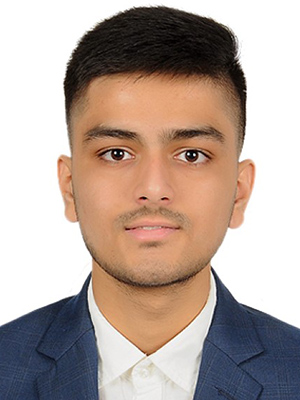
Raj Panthesh Bhavsar is an enthusiastic graduate student pursuing a master's degree in the Artie McFerrin Department of Chemical Engineering. He is keen on using the extensive resources available at the university to advance his research. He enjoys working on his thesis in Dr. Joseph Kwon's research lab, where he works on projects like microwave reactor modeling and optimizing the material design of the CO2 adsorbent that is used for Direct Air Capture Process. Bhavsar appreciates the support and camaraderie of his lab mates and values the support of his advisor in the journey of graduate school. He believes that research and the will to practice it sincerely go hand in hand.
Microwave reactor modeling is the focus of Bhavsar’s research regarding modeling the adsorbent process for material design. Bhavsar said this project works on modeling microwave physics to design and optimize adsorbent material.
“The carbon dioxide is captured using the direct air capture process, wherein we directly capture carbon dioxide from the surroundings in the open environment,” Bhavsar said. “Once the carbon dioxide is adsorbed, the tough task is to regenerate the sorbent that adsorbs CO2 (carbon dioxide) . Using microwaves helps in saving energy costs when compared to conventional heating for regeneration. Along with energy savings, this methodology of regeneration also prevents the adsorbent from material degradation.”
After defending his master’s thesis, Bhavsar plans on doing a deeper dive into his research and then using his technical skills in the chemical engineering industry after he gets his doctorate.
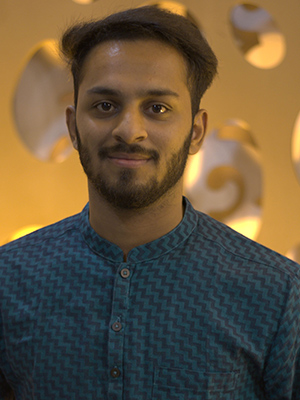
Jitendra Choudhary, a graduate student in chemical engineering under the supervision of Dr. Sreeram Vaddiraju, specializes in synthesizing nanowire foams and multifunctional shape memory composites for space and biomedical applications. He holds a B.S.-M.S. in chemical engineering with a minor in chemistry from IISER Bhopal, where he was recognized for outstanding academic performance with a proficiency gold medal. Choudhary has garnered prestigious accolades, including the Most Versatile Chemical Engineering Student in India for 2023 from IIChE, the Acharya P.C. Ray Award from IIChE and the Sir J.C. Bose Best Master's Thesis Award from ISEES in 2022.
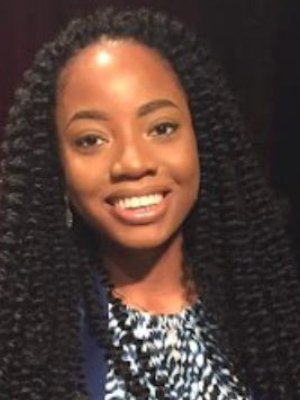
Gladden Chukwu is one of the recipients of the Francine & James Srygley ’54 Fellowship award. She completed her bachelor’s degree in chemical engineering and mathematics from the Texas A&M University-Kingsville in 2019. She is currently in her first year of her master's degree in chemical engineering. Chukwu is passionate about energy, sustainability and learning new concepts and ideas. Her passion has stemmed her research interest in the degradation of plastics using biological materials. She is undertaking this research under Dr. Qing Sun.
Chukwu said the fellowship helped further her research but also gave her a better understanding.
“I knew that the fellowship was going to be very helpful in the next semester because that's when I'll be intensely focusing on my research,” Chukwu said. “Having more time to focus has made me understand my research better. I had to meet with Ph.D. students in my lab and that really opened my eyes and gave me more insight into my fellowship.”
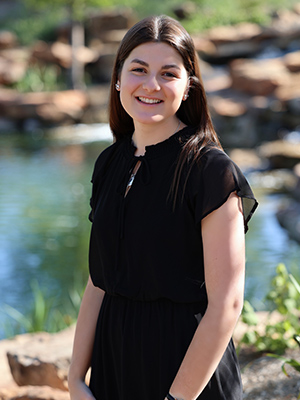
Madeline Demny is a recipient of the Francine & James Srygley '54 III Graduate Fellowship. She received her bachelor's degree in chemical engineering from Texas A&M University and continued into graduate studies through the fast track master's program at Texas A&M. She is working with Dr. Phanourios Tamamis, an associate professor in the chemical engineering department. Demny's research interests include using computational methods to understand rules of life in protein folding and recognition of modified RNA. She has co-authored one paper and is a recipient of the Craig C. Brown Outstanding Senior Engineer Award.
For Demny, the finances associated with the fellowship have allowed her to stay at Texas A&M to continue her research, which might not have been possible otherwise. She is considering staying in academia to share her knowledge with future researchers.
“My goal is to be a professor,” Demny said. “I enjoy teaching, and I want to share the knowledge that I have of chemical engineering and be able to pass it on to the next generation.”
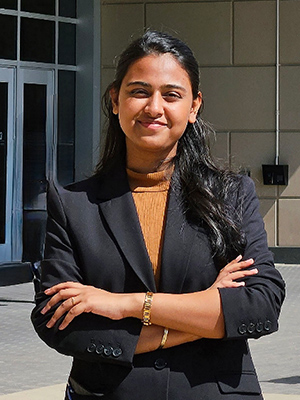
Aovi Deshpande is currently pursuing my master's in chemical engineering with a focus on process systems optimization. Her current work revolves around resilience assessments for facilities and its integration in water, energy and food nexus. Her motivation for research in the field of technology scale up, process engineering and optimization originates from her passion for creating tangible solutions to real-world problems. She is driven by the prospect of applying scientific principles, conducting experiments and gathering data to uncover new insights to address critical issues, such as resource optimization, sustainability and process efficiency.
Depending on the project, Deshpande said she would consider continuing her education with a doctorate.
“If I get a Ph.D., I would like to go into industry,” Deshpande said. “I personally would like projects on energy and process systems optimization. I'm really interested in the process of scaleups so picking technology from a lab scale to commercialization, that's something that really excites me.”
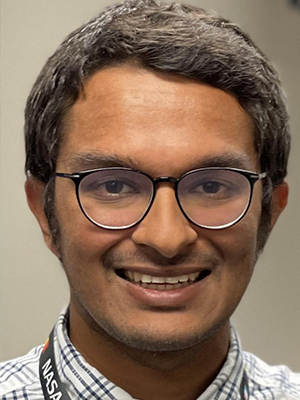
Sayyam Deshpande received his bachelor’s degree in chemical engineering at the University of Mumbai, India in 2021 and joined the chemical engineering master’s program at Texas A&M in spring 2022. During his undergraduate studies, his research focused on wastewater treatment technologies and modified atmospheric packaging. He received the Francine & James Srygley ’54 III graduate fellowship in fall 2023. His research now focuses on developing structural battery electrolytes for low-temperature applications in aircraft and spacecraft. He interned at NASA as a battery engineer in summer 2023 working on a battery safety-related project to enable the safe application of lithium metal anodes in pouch cells.
Deshpande’s research also focuses on recycled plastic. Most specifically, the carbon nanomaterials from developing applications for industrial carbon nanotubes derived from sustainable sources.
“It's a dream of industry to take your mission products and develop them into something very usable for the environment and use them in electrochemistry,” Deshpande said. “We've been able to develop a system that can operate safely at minus 40 degrees centigrade. We've been able to share great different compositions of a system in which we created a two-phase electrolyte.”
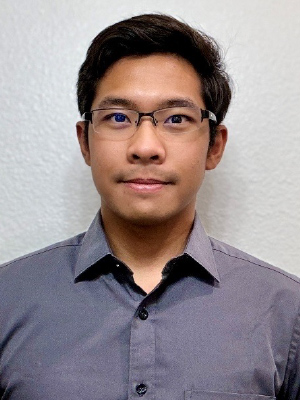
Jason Mangalindan is the recipient of Francine and James Srygley ’54 Graduate Fellowship. He earned his bachelor’s degrees in chemical engineering and chemistry from Mapúa University, Philippines, and performed his undergraduate research at National Cheng Kung University, Taiwan. He then worked with the research and development team of a semiconductor company for three years before joining the chemical engineering master’s program at Texas A&M in 2023. He is currently working in the Catalysis and Sustainable Technologies Laboratory under the supervision of Dr. Manish Shetty. Mangalindan’s research focuses on the hydrogenation of carbon dioxide to dimethyl ether by utilizing bi-functional catalysts.
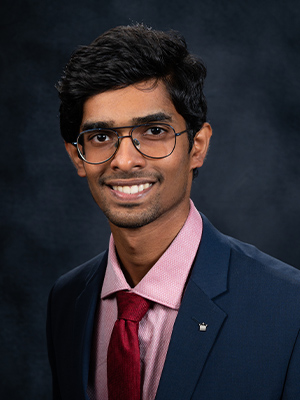
Suraj Panicker received his bachelor’s degree in chemical engineering from Birla Institute of Technology and Science Pilani, Hyderabad in 2021. He joined Texas A&M as a master of science student in fall 2022. Since then, he has been a part of Dr. Manish Shetty’s research group. His research aims to provide a potential solution for the problems faced with the disposal of plastics by taking an alternate route of establishing a sustainable circular plastic economy where polymer chains can be broken down into useful smaller chain alkanes. Apart from this, he has also interned at Siemens Energy, where he worked on designing pressure relief valves and analyzed relations between feed properties in specific cases of overpressure scenarios.
“My research is in the field of catalysis,” Panicker said. “This work involves upcycling plastics in a way to convert plastics into more useful products. Obviously, plastic is one of the biggest problems today, and how we convert them into useful products, and how we can do this effectively by utilizing the cobalt catalyst system in this. This will help in the recycling process.”
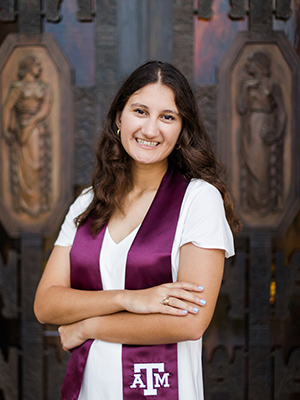
Savanah Pas received her bachelor’s degree from Texas A&M in December 2022 in chemistry and applied mathematics and joined the master's program in spring 2023. She is working with Dr. Micah Green in the chemical engineering department. Pas’ research interests include synthesis of Ti MXenes and their applications. Pas was an intern at Texas Instruments in summer 2023 as a process engineer.
The variety of the students' research expands to 2D nanomaterials from Pas, who is currently working on 2D Carbon transition metal materials called MXenes.
“These properties of both carbon and the transition metal specifically, the one we look at most of the time is titanium,” Pas said. “We're looking at how the properties can be used in industrial applications, specifically electrochemical applications, and looking at the degradation over time and analyzing how we can prevent degradation of materials.”
Pas also acknowledged how the fellowship opportunity has given her more time in the lab for her research, allowing more time for characterization and analysis.
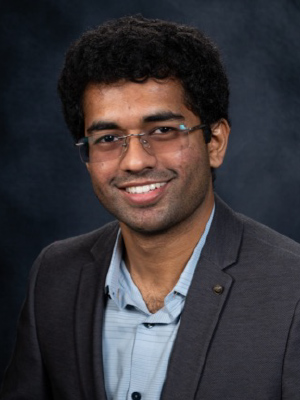
Vignesh Shankar is a researcher at Texas A&M, co-advised by Dr. Micah Green and Dr. Benjamin Wilhite. His passion lies in advancing the energy transition to cleaner sources, particularly green hydrogen. His work includes a groundbreaking master's thesis on laser-induced graphene for selective separation of hydrogen gas. He also had an impactful internship as an electrolyzer cell development co-op at Electric Hydrogen.
Additional research from Shankar includes a focus on the selective separation of hydrogen gas using Laser Induced Graphene (LIG) membrane technology.
Ultimately the aim of Shankar’s research is to contribute to the scaling up of industrial blue and green hydrogen production, he said. In ongoing work, Shankar plans to explore the selectivity of hydrogen gas in the presence of higher multi-component gas mixtures.
“By achieving this selective separation, we can enhance the efficiency and sustainability of hydrogen production, facilitating the transition to cleaner energy sources,” Shankar said. “I have achieved repeatability in experiments that demonstrate increased flux and selectivity for hydrogen gas with binary gas mixtures of H2( hydrogen gas)containing CO2 and N2 (Dinitrogen) across LIG.”
With the recognition from this award, Shankar believes it could significantly impact his career trajectory along with enhanced research opportunities.
“As more people become aware of my work, my opportunities for career advancement and research funding may increase. The recognition can open doors to research opportunities that might not have been available otherwise contribute to the expansion and diversification of my research portfolio," Shankar said. "It signifies that my research is of high quality and has the potential to make a significant impact. It demonstrates that experts in my field recognize the value and potential of my work.”
In Shankar’s future, he is committed to advancing research on hydrogen separation and aims to tackle some of the challenges associated with its storage and transportation.
“By pursuing a career as an electrochemist, I aim to further expand my knowledge and expertise in this field of green hydrogen production, using my time at Electric Hydrogen as a strong foundation,” Shankar said. “This experience fueled my passion to delve deeper into the research on innovative approaches for efficient green hydrogen production and separation methods.”